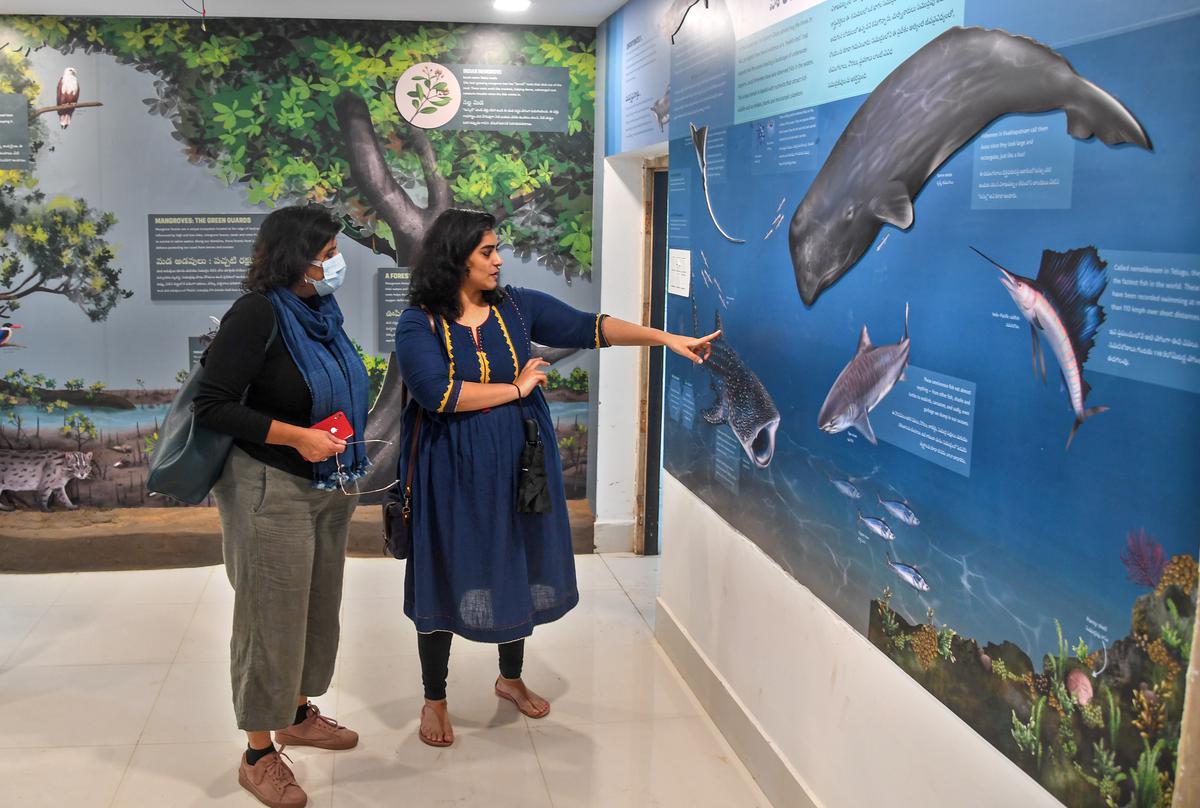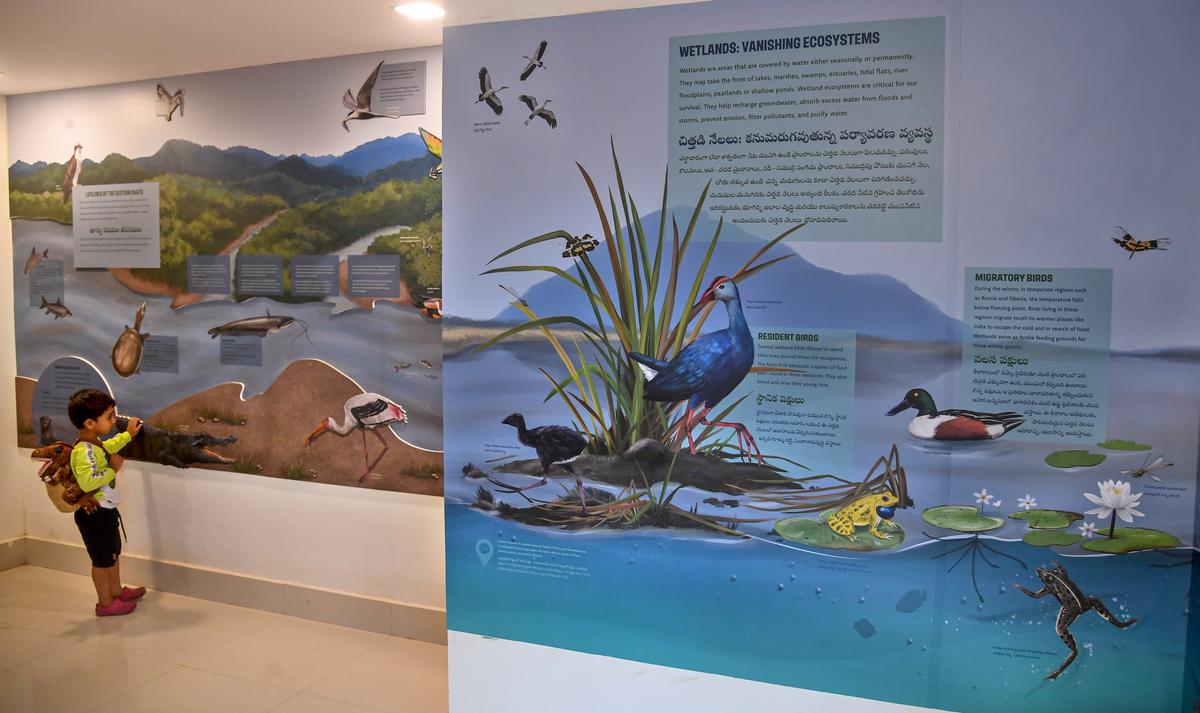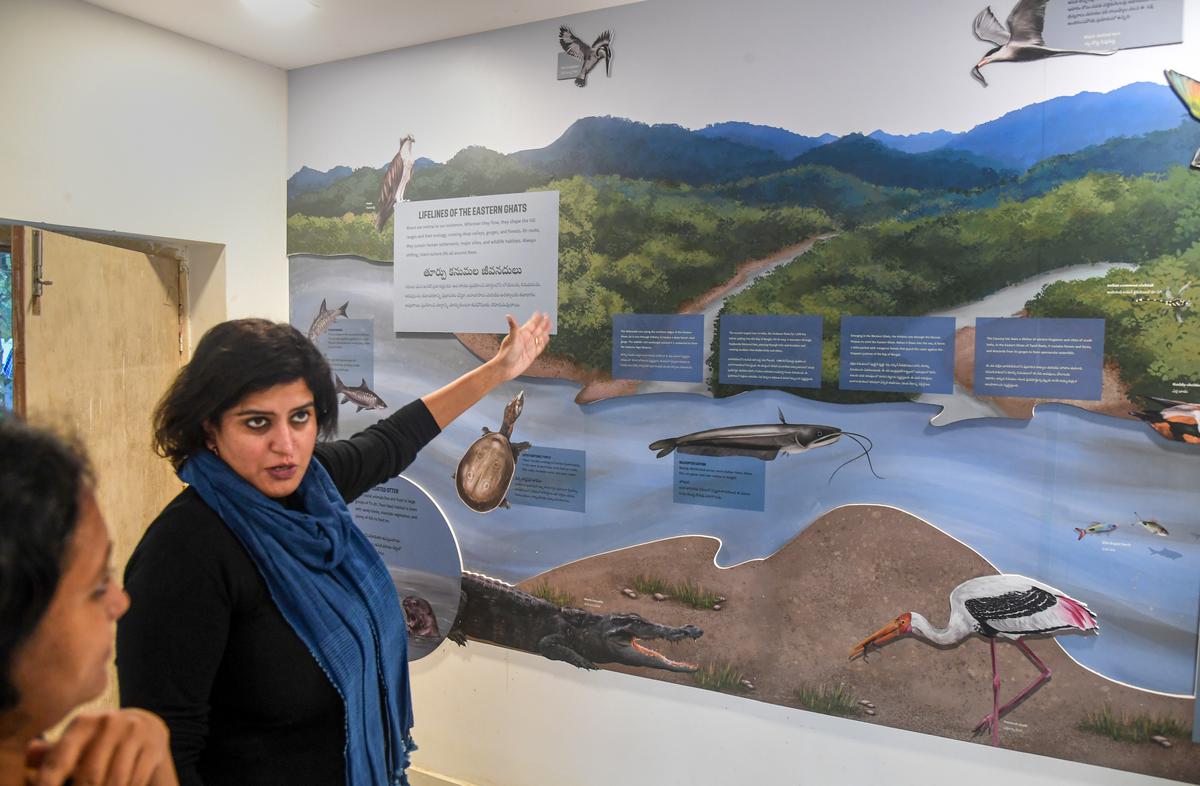A flooring to ceiling map introduces guests to the panorama of the Eastern Ghats, parallel to the japanese coast of India, stretching from Odisha to Tamil Nadu. A door forward results in a sun-lit room with a window dealing with the mountains, that includes water-colour sketches of iconic species of crops discovered in the area, together with a number of which are discovered solely throughout the Eastern Ghats. A few of those are severely threatened with extinction.
The new Nature Interpretation Centre, a separate part on the recently-inaugurated Eastern Ghats Biodiversity Centre close to PM Palem, is an immersive expertise of traversing by the various ecosystems of the area, that has lengthy awaited a scientific documentation. Located alongside the periphery of the Kambalakonda Wildlife Sanctuary in Visakhapatnam, the centre is a first-of-its-kind art-led challenge of the Andhra Pradesh Forest Department.
The brainchild of Visakhapatnam Divisional Forest Officer Anant Shankar, every part affords guests a multifaceted view highlighting the area’s pure wonders complemented by inventive artwork shows.
A bilingual challenge in English and Telugu, the centre is an attention-grabbing collaboration amongst analysis, content material and artwork, put collectively by a crew consisting of Bengaluru-based wildlife artist Sangeetha Kadur and illustrators, sculptors, architects, wildlife biologists, translators and content material creators from throughout India.
A view of the recently-inaugurated Eastern Ghats Biodiversity Centre close to PM Palem in Visakhapatnam.
| Photo Credit:
KR Deepak
“This centre showcases the critical ecosystems of the Eastern Ghats and also shows the association of tribal communities with the forests. Divided into different sections in the ground and first floors, it throws light on marine, coastal and wetland ecosystems. The mangrove ecosystem replica is the highlight of the Nature Interpretation Centre,” says Anant Shankar.
Located in the primary flooring, the mangrove wall highlights the mangrove forest that stands like a wall of protection alongside the Andhra Pradesh coast defending it from storms and cyclones. It additionally options creatures that inhabit them, together with the elusive fishing cat. “We have recreated a scene from a mangrove forest and for realistic depiction, have brought roots from a mangrove forest. The wall also uses laser cuts for an extra dimension and an interesting visual perspective,” says Megha Moorty of RoundGlass Sustain, a social influence initiative that collaborated in the challenge.

The crew of artists and content material creators explaining concerning the works on the first-of-its-kind Nature Interpretation Centre, a brand new part on the recently-inaugurated Eastern Ghats Biodiversity Centre close to PM Palem in Visakhapatnam.
| Photo Credit:
KR Deepak
The integration of artwork work and sculptures seamlessly mix into the encircling panorama, inviting friends to ponder the intricate relationship between artwork and Nature.
“The choice to use illustrations and art (over photographs) was deliberate. An artist has complete control over how to depict a space — to control the angle of the species, the background, the lighting. An artist is able to curate the scene. However, it comes with great responsibility to ensure the depictions are accurate and we highlight species that need our attention. Art also has the ability to draw people in, and hold their attention. It is not age-specific. Our hope is that this art project will inform, educate and inspire visitors to care about the rich biodiversity of the Eastern Ghats,” says Sangeetha. While a lot of the partitions have digital illustrations pieced collectively to current the bigger image, two panels associated to the flora of Eastern Ghats had been illustrated in water-colour on paper by Sangeetha and Bengaluru-based artist Shilpashree, which was later scanned to be produced digitally together with the textual content.

A youngster going across the first-of-its-kind Nature Interpretation Centre, a brand new part on the recently-inaugurated Eastern Ghats Biodiversity Centre close to PM Palem in Visakhapatnam.
| Photo Credit:
KR Deepak
The floor flooring shines the highlight on 4 of probably the most elusive and endangered species of the Eastern Ghats — the Indian pangolin, Mysore slender loris, Jerdon’s courser and Jeypore floor gecko. “ TC Jerdon, a British surgeon and naturalist, first recorded the Jerdon’s Courser in 1848 from the Eastern Ghats. However, for 85 years, it wasn’t seen and thought to be extinct, until it was rediscovered in 1986 in Kadapa district,” says Megha. The Indian pangolin is likely one of the most trafficked animal in the world, smuggled in India and throughout borders for its scales and different physique elements which are wrongly believed to have medicinal makes use of.
Another particular part is devoted to forests and highlights the lesser-known sides of Kambalakonda Wildlife Sanctuary, which hosts dry evergreen forests, a highly-threatened and distinctive forest sort seen solely in Tamil Nadu and Andhra Pradesh in India.

The crew of artists and content material creators explaining concerning the works on the first-of-its-kind Nature Interpretation Centre, a brand new part on the recently-inaugurated Eastern Ghats Biodiversity Centre close to PM Palem in Visakhapatnam.
| Photo Credit:
KR Deepak
The first flooring has richly illustrated sections on river that highlights the 4 rivers – Mahanadi, Godavari, Krishna and Cauvery – that stream by the Eastern Ghats; an inter-tidal zone; a piece devoted to butterflies that includes their spectacular migration from Eastern to Western Ghats; and a marine and a ficus part.
In a small nook, the caves part is arising that invitations folks to expertise the low-light ecosystem in a sculpted room. This will showcase replicas of stalactites and stalagmites and completely different cave formations of the area, in an try to recreate the sensation one would get in the event that they walked right into a cave together with its soundscapes. The part will deal with a few of the lesser-known cave species and spotlight their survival methods in the difficult ecosystem that exists with out mild. Local sculptors have recreated the constructions in the cave room.
While a majority of labor on the Nature Interpretation Centre of the Eastern Ghats is over, the remainder can be accomplished by the top of December. The place guarantees to be a haven the place conservation, training and creative expression converge., beckoning guests to discover and cherish the enchanting tapestry of the Eastern Ghats.
The Eastern Ghats Biodiversity Centre close to PM Palem (beside Vizag Conventions) is a full-fledged information hub that has sections like a medicinal plant backyard, an orchidarium, a library (arising) that focuses on Nature literature, a ficus backyard with 46 species and a one-its-kind Nature Interpretation Centre of the Eastern Ghats. Open from 9am to 5pm.


